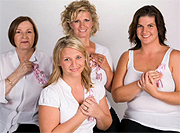
THURSDAY, Dec. 6 (HealthDay News) — Younger women with aggressive breast cancers often benefit more than older women when they undergo early, pre-operative chemotherapy, a new study finds.
A team of German scientists found that women aged 35 or younger who underwent “neoadjuvant” chemotherapy — chemo given before surgery to help shrink a tumor and make it more operable — responded better than women over 35 who received the same treatment.
“This study suggests that chemotherapy is a good idea early on in younger patients. In our study, the younger-than-35 women had a higher chance of having no residual tumor left in the breast than older women,” said study author Dr. Sibylle Loibl, associate professor of obstetrics and gynecology at the University of Frankfurt, in Germany.
The research is to be presented Thursday at the 2012 San Antonio Breast Cancer Symposium in San Antonio, Texas.
“Breast cancer in young women is rare — only about 5 percent of patients are under 35,” Loibl noted. Tumors in younger women, however, tend to be more aggressive, so researchers are keen to find successful treatments for this age group.
To help do so, Loibl and colleagues evaluated the health records of almost 9,000 women with operable or locally advanced breast cancers that had not yet spread beyond the breast. All of the women were treated with neoadjuvant chemotherapy, which could include radiation, drugs or both. The data was drawn from eight German studies.
A smaller subgroup of more than 700 women aged 35 and younger was compared to the older women with the disease. Loibl said the researchers looked at patient survival rates as well as “pathologic complete response,” meaning the absence of any residual invasive cancer in the breast. They also looked at the absence or presence of metastatic cells in the lymph nodes near the breasts.
The response to neoadjuvant chemotherapy treatment was significantly higher in the younger women — nearly 24 percent of the younger women responded to the treatment compared with about 16 percent of the older patients, Loibl said.
The biological makeup of a young woman’s tumor also seemed to play a role, she added. Breast cancer specialists divide tumors into separate molecular subtypes based on cellular receptors and other key factors. Loibl said young women with what are called “luminal” tumors seemed to do especially well after neoadjuvant chemotherapy.
“This is not true for other age groups, which indicates that breast cancer in the young — even when it is a luminal-type breast cancer — is chemosensitive,” she said in a symposium press release.
One expert said the findings are in line with current thinking on breast cancer.
“We’ve learned that breast cancer is certainly not one disease but a family of diseases, and it presents differently in different women,” said Chandini Portteus, vice president of research, evaluation and scientific programs at the nonprofit advocacy group Susan G. Komen for the Cure.
“This study offers more understanding that a younger age group has a different type of breast cancer and a different response to treatment,” said Portteus, who is attending the conference in San Antonio. “These women specifically have a luminal-type breast cancer and triple negative breast cancer, and we know those are more aggressive subtypes of cancer that present earlier on in life than some others, but we don’t yet know enough about how to predict who will be at risk.”
Dr. Patricia Ganz, director of the division of cancer prevention and control research at the Jonsson Comprehensive Cancer Center at the University of California, Los Angeles, said, “What this tells us is that in spite of having a higher-risk disease, younger women paradoxically have a better likelihood of response due to the types of breast cancer they are more likely to have.”
Ganz, who also is attending the conference, said the study is unique because of the large sample of breast cancer patients under age 35 that the researchers were able to analyze statistically.
“They were able to combine eight trials with over 6,500 women whose tumors were able to be evaluated,” she said. “Breast cancer in women this age is so uncommon that a single trial would not be able to answer this question.”
Should the findings change treatment protocol in women under 35?
The researchers did not compare neoadjuvant chemotherapy to other treatments, but study author Loibl said chemotherapy early “may be a good idea” in younger patients.
For her part, Ganz said the findings do not change treatment recommendations, but they do help explain the differences in disease characteristics in younger women and show that they actually may benefit from chemotherapy.
“The decision to use neoadjuvant therapy is based on the size of the tumor and the woman’s desire for possible breast conservation,” Ganz said. “Studies have not shown any survival benefit by giving the same chemotherapy before, instead of after, breast surgery.”
Research presented at medical meetings should be considered preliminary because it hasn’t undergone a peer-review process.
More information
Learn more about breast cancer care at the American Cancer Society.

